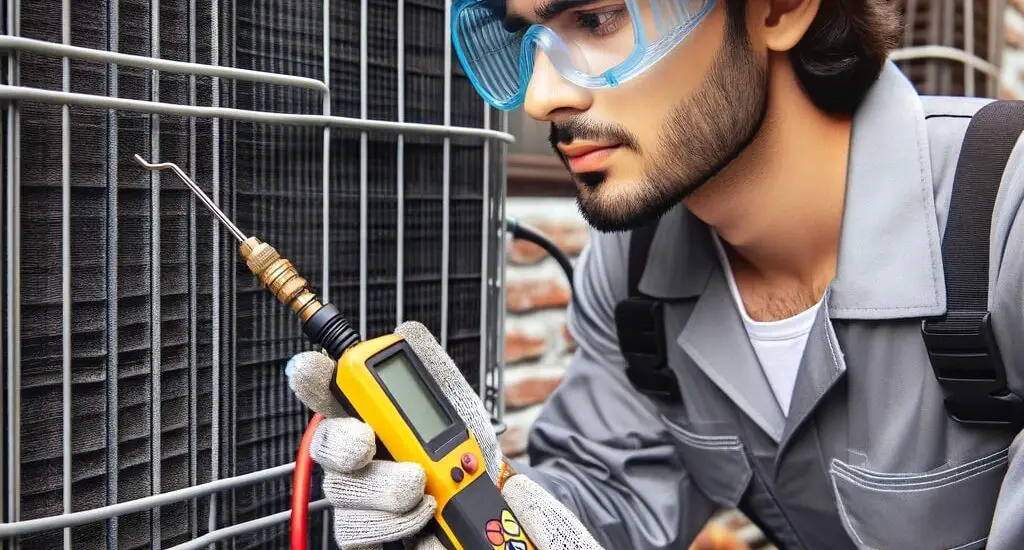Do Freon leak detectors work? This article will guide you step-by-step through the process of how these detectors function, their reliability, and how to effectively use them.

Table of Contents
Do Freon Leak Detectors Work?
Freon leak detectors are specifically designed instruments that detect the presence of refrigerant gases, such as chlorofluorocarbons (CFCs), hydrochlorofluorocarbons (HCFCs), and hydrofluorocarbons (HFCs), which are commonly referred to as Freon. They are essential in identifying leaks to prevent the release of these gases, which can be environmentally damaging and decrease the efficiency of your HVAC system.
These detectors function effectively under a range of conditions, but their performance can be influenced by factors such as the type of refrigerant used, the size and rate of the leak, and ambient environmental conditions. In general, when used correctly, Freon leak detectors are reliable tools for ensuring system integrity and efficiency.
Types of Freon Leak Detectors
There are several types of Freon leak detectors available on the market. Each has its own specific use case and operational method. Understanding the differences can help you choose the right tool for your needs.
Electronic Detectors
Electronic Freon leak detectors are highly sensitive and provide quick responses to even the smallest of leaks. They utilize sensors that measure changes in the chemical composition of the air surrounding your HVAC system’s components.
The sensor reacts to an increased concentration of Freon by triggering an alarm or indicator light. This instant feedback allows for the rapid identification and repair of leaks.
To enhance the accuracy of electronic detectors, it is essential to:
Regularly calibrate the device to maintain sensitivity.
Ensure the tip of the detector is clean to avoid false readings.
Use in environments with minimal air movement to prevent diluting the refrigerant concentration.
You can get this Freon Leak Detector from Walmart.
Ultraviolet (UV) Detectors
UV detectors employ a specialized approach, where a UV-reactive additive mixed with the refrigerant will glow under a UV light, indicating the presence of a leak. This method requires the refrigerant to be circulating, which means the HVAC system must be operational during the inspection.
Here are detailed steps for using UV detectors:
Safely inject the UV dye into the refrigerant system, ensuring the system is off and you are wearing protective equipment.
Allow the system to run for a sufficient period, so the dye can spread throughout the system and exit through leaks.
Inspect all system components with a UV lamp, paying close attention to common leak sites like joints and valves.
Dye-Based Detectors
Dye-based detectors are similar to UV detectors but involve a slightly different process. They are most effective for periodic maintenance checks and systems where leaks are suspected but not easily found with electronic detectors. The dye, once circulated throughout the system, leaves a visible mark at the leak point.
Important considerations when using dye-based detectors include:
Choosing a dye that is compatible with the system’s refrigerant and oil.
Allowing time for the dye to circulate thoroughly, which may take several days depending on the system size.
Thoroughly inspecting all potential leak points after adequate circulation time has passed.
Using Freon Leak Detectors Effectively
Regardless of the type of detector you choose, proper usage is key to identifying leaks accurately. Here’s how to ensure you’re getting the most out of your Freon leak detector:
Prepare the Detector
Proper preparation of the detector is crucial for accurate leak detection. This involves:
Reading and understanding the user manual for the specific detector model.
Performing a functionality test in a non-contaminated environment to ensure the detector is working correctly.
Calibrating the detector as recommended by the manufacturer to maintain sensitivity.
Check for Leaks Regularly
Regular leak checks are vital for detecting issues before they become significant problems. To ensure the ongoing integrity of your HVAC system:
Perform scheduled leak checks, especially after any maintenance or repairs.
Look for signs of reduced cooling efficiency and increased energy bills, as these can be indicators of leaks.
Be vigilant in inspecting common leak areas, such as connections, valves, and fittings.
Follow Safety Precautions
Safety is paramount when working with refrigerants. Prioritize safety by:
Wearing protective gear, including gloves and goggles, when handling refrigerants and leak detection equipment.
Working in a well-ventilated area to avoid inhaling harmful gases.
Following all safety guidelines provided by the manufacturer of the HVAC system and detector.
